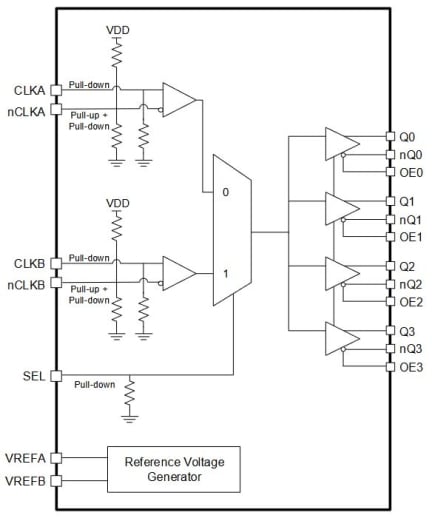Overview
Description
The 8P34S1204 is a high-performance differential LVDS fanout buffer. The device is designed for the fanout of 1PPS signals or high-frequency, very low additive phase-noise clock and data signals.
The 8P34S1204 supports fail-safe operation and is characterized to operate from a 1.8V or 2.5V power supply. Guaranteed output-to-output and part-to-part skew characteristics make the 8P34S1204 ideal for those clock distribution applications demanding well-defined performance and repeatability. Two selectable differential inputs and four low skew outputs are available. The integrated bias voltage reference enables easy interfacing of single-ended signals to the differential device input. The device is optimized for low power consumption and low additive phase noise.
The 8P34S1204-1 has an individual OE control pin for each output, which provides excellent control over the output enable functions.
Features
- Four low skew, low additive jitter LVDS output pairs
- Individual OE control pin for each output
- Two selectable, differential clock input pairs
- Differential CLK, nCLK pairs can accept the following differential input levels: LVDS, CML
- Maximum input clock frequency: 2GHz
- LVCMOS/LVTTL interface levels for the control input select pin
- Output skew: 10ps (typical)
- Propagation delay: 475ps (maximum)
- Low propagation delay variation across temperature for 1PPS applications
- Low additive phase jitter, RMS; fREF = 156.25MHz, VPP = 1V, 12kHz – 20MHz: 50fs (typical)
- Device current consumption (IDD): 100mA (typical)
- Full 1.8V or 2.5V supply voltage
- Lead-free (RoHS 6), 28-Lead VFQFPN package
- -40 °C to 85 °C ambient operating temperature
- Supports case temperature up to +105 °C
Comparison
Applications
- 4G and 5G radio unit (RU) and distributed unit (DU) systems
- Ethernet switches/routers
- Medical imaging
- Professional audio and video
- Data centers and servers
Documentation
|
|
|
|
|---|---|---|
| Type | Title | Date |
| Datasheet | PDF 625 KB | |
1 item
|
||
Design & Development
Models
ECAD Models
Schematic symbols, PCB footprints, and 3D CAD models from SamacSys can be found by clicking on products in the Product Options table. If a symbol or model isn't available, it can be requested directly from the website.

Product Options
Applied Filters:
